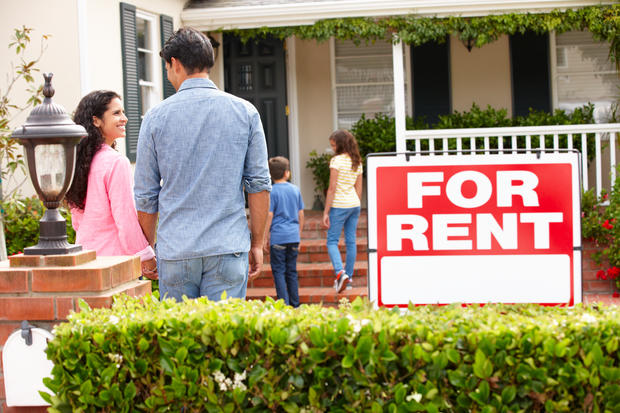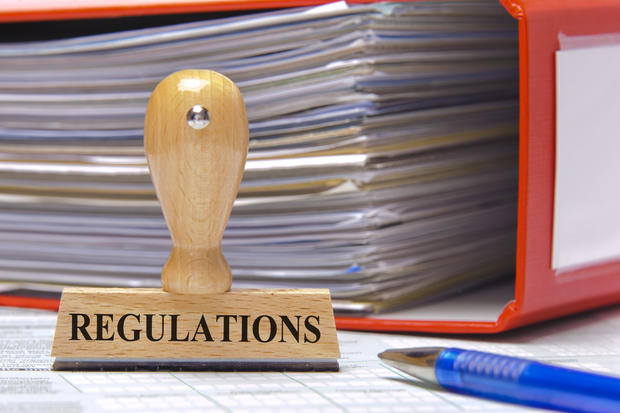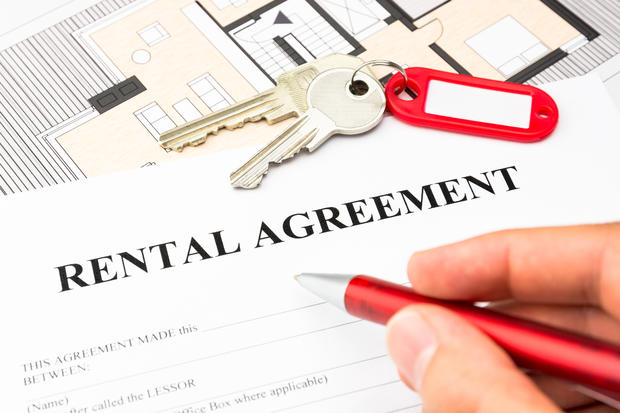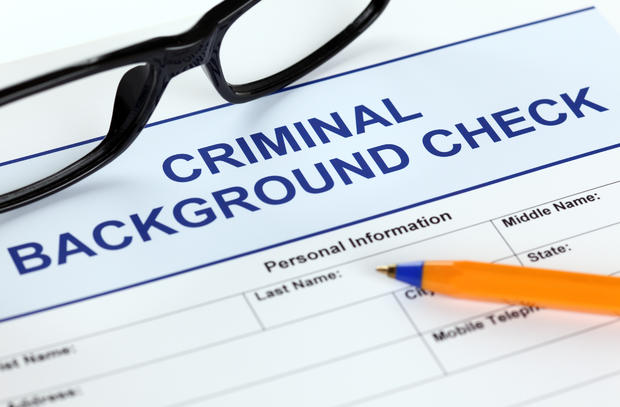9 things to consider before becoming a landlord
Investing in a rental property and becoming a landlord could be a smart move in 2016 -- but it's important to understand the commitment first.
Late last year, real estate website Zillow predicted that the U.S. would see "the highest median rents ever." At the same time, many lower-income Americans may be priced out of homeownership as home prices rise faster than incomes, Zillow said.
Becoming a landlord might sound like an easy way to make money: Buy a property, find tenants and watch the rent checks roll in. But it can be a costly undertaking that requires a lot of time and shouldn't be taken on without consideration and research, said Lucas Hall, a Washington, D.C.-area landlord and founder of Landlordology.com.
Is becoming a landlord a good option for you? Click ahead for 9 things experts say you should think about and plan for before investing in rental properties.
Understand the time and financial commitment involved
Before you start looking at properties or take other steps, make sure you're willing and able to commit the time and financial resources necessary to be successful, said John Nuzzolese, an East Meadow, New York-based landlord, real estate broker and president of the Landlord Protection Agency.
"People need to understand that this is a business, not a hobby," he said. "You need to take it seriously. The people who make it a hobby usually run into problems because it's not their top priority."
Beyond committing the time and money required to maintain homes, you must be ready to deal with tenants' needs.
If you don't have the time to dedicate to the role, or want to save yourself some stress, you may want to consider hiring a property management company to do some of it for you. Although this is an added expense -- roughly 10 percent of each month's rent, plus a potential finder's fee for new tenants -- the company will take over most of the duties associated with being a landlord, from finding new tenants and collecting rent to mowing the lawn and maintaining the property.
Take the time to do your homework and evaluate your financial resources before taking the plunge and becoming a landlord.
Know where and what you want to buy
"I recommend that (landlords) look for a quality rental property so they can attract quality tenants," Nuzzolese said. While fixer-upper homes in less-desirable neighborhoods will come with lower price tags, they might not get you as good a return on your investment.
Location is one of the biggest factors in choosing a rental property. For example, Hall said tenants are willing to pay up to 25 percent more in rent for homes located near public transportation.
It can be tempting to buy a fixer-upper and make a few improvements, but "some buy a fixer-up and then never really fix it up," Hall said. That can lead to problems with local code enforcement and fines, he added.
Check your state and local laws
Before you buy a property to rent out, make sure you're well-versed in the local and state laws and guidelines.
Sometimes zoning ordinances or a homeowners or condo association won't allow properties in a certain area to be used as rentals, Hall said.
You may also be required to pay special fees or taxes on rental properties, or have to undergo regular inspections. If you don't follow these rules, you could face hefty fines, Hall said.
Other laws regulate tenants' and landlords' rights and responsibilities and dictate the things that must be covered in your rental agreement. Many free resources online offer rental agreement templates, but if you don't use one that follows your state's guidelines, it could be invalid and lead to problems if you ever have to take a tenant to court, Hall and Nuzzolese said.
Get legal advice
To make sure your lease is valid and meets all the state and local requirements, it's a good idea to take it to a lawyer who specializes in real estate, Hall said.
"It's worthwhile to pay an attorney to look at the lease and provide feedback or suggest changes," he said. "Then you can use it over and over."
You may also want to have an attorney lined up in case you need to take a tenant to court, Nuzzolese said.
"A lot of landlords are so afraid of having to take a tenant to court -- and they don't have an attorney -- that they allow tenants to fall very far behind in rent," Nuzzolese said.
By having an attorney and dealing with problems promptly, landlords can save themselves thousands of dollars in lost rental income, he said.
Have a plan to maintain the property
When something in your rental property breaks -- and something will -- it's a good idea to have a trusted repair company ready to go, Nuzzolese said.
Tenants will want problems, especially big ones like a leaky roof or a broken heater, to be fixed as quickly as possible. Prompt action will keep them happy and could make them more likely to renew their lease.
Nuzzolese said he also pays a lawn care company to handle the mowing on his properties.
"In many cases landlords have tenants responsible for mowing under the lease," he said. "But many property managers prefer to have their own lawn services to take care of the outside of the property because the tenants might not do as good of a job."
Set aside money for expenses
"I think the number one cost that people don't prepare for is capex," Hall said.
In this case, "capex," or capital expenditures, could include what you spend on large repairs like a new roof, appliances or windows.
"You're going to have to replace the roof eventually," Hall said. "A roof is good for 10, 15 or maybe 20 years if it's a really good roof. Those are huge expenses that are hard to predict and pay for."
Before you invest in a rental property, be sure you're financially equipped to handle these issues when they come up. Failure to maintain your property to the standards set by local and state authorities could result in fines.
Set up a tenant screening process
Hall and Nuzzolese both stressed the importance of having a thorough screening process for potential tenants.
"I always say that 95 percent of a landlord's problems can be eliminated in the tenant screening process," Nuzzolese said.
When accepting tenant applications, run credit and background checks on all adults who will be living in your property and contact their last two landlords, Hall suggested.
Make sure your tenant can afford to pay rent each month. Most landlords only rent to tenants whose income is two or three times their rent payment, Hall said.
You should also avoid renting to family or friends and avoid becoming friends with your tenants, Nuzzolese said.
"It's hard to maintain a good business relationship with a family or friend," he said. "It makes it hard to enforce the rental agreement because they expect you to let things slide."
Know how to handle tenant problems
Even with a good screening process, you may still run into problems with tenants. They may fail to pay their rent on time or cause damage to the property.
When they move in, have tenants sign a report indicating the condition of the property and appliances, Nuzzolese said. That way, you have documentation of any damage that was present before they arrived.
Your rental agreement should include the penalties you can impose if the tenant violates any part of the agreement, like getting three giant dogs when the apartment is supposed to be pet-free or installing an unauthorized satellite dish, Hall said. If the fines and fees aren't part of the rental agreement, you have no right to charge the tenant for these violations.
This is another area where it's important to understand your state and local laws. Each state has rules for how much time you must give your tenants to fix a problem before you can take legal action.
If it gets to the point where you need to evict a tenant, you take them to court, where a judge will look at the rental agreement and determine whether the tenant has violated it. If the judge orders the tenant be evicted, you cannot lock them out or force them from the property, Hall said. You must have the local police or sheriff's department remove the tenant.
Know how you want to collect rent
The most important part of the landlord gig is collecting rent from your tenants, so you want to make it as easy as possible, Hall said. While telling your tenants to send you a check or deposit money directly into your bank account may be easy for you, it might not be the best solution for your tenants.
"Modern, tech-savvy tenants want to make electronic payments," Hall said. Cozy, the company that owns Landlordology.com, offers a free online platform where landlords can collect electronic payments and manage the finances for their properties.
Several other companies also offer online payment services for landlords, including ClearNow, Rentec Direct and RentPost.









